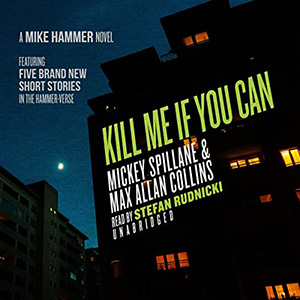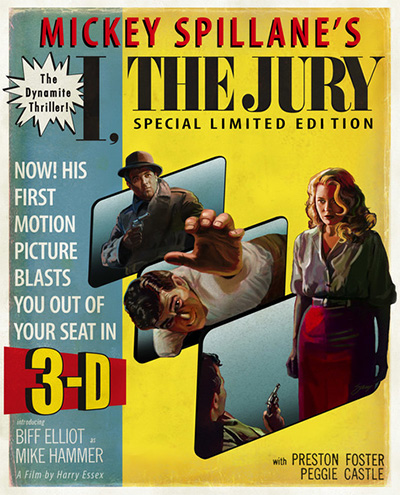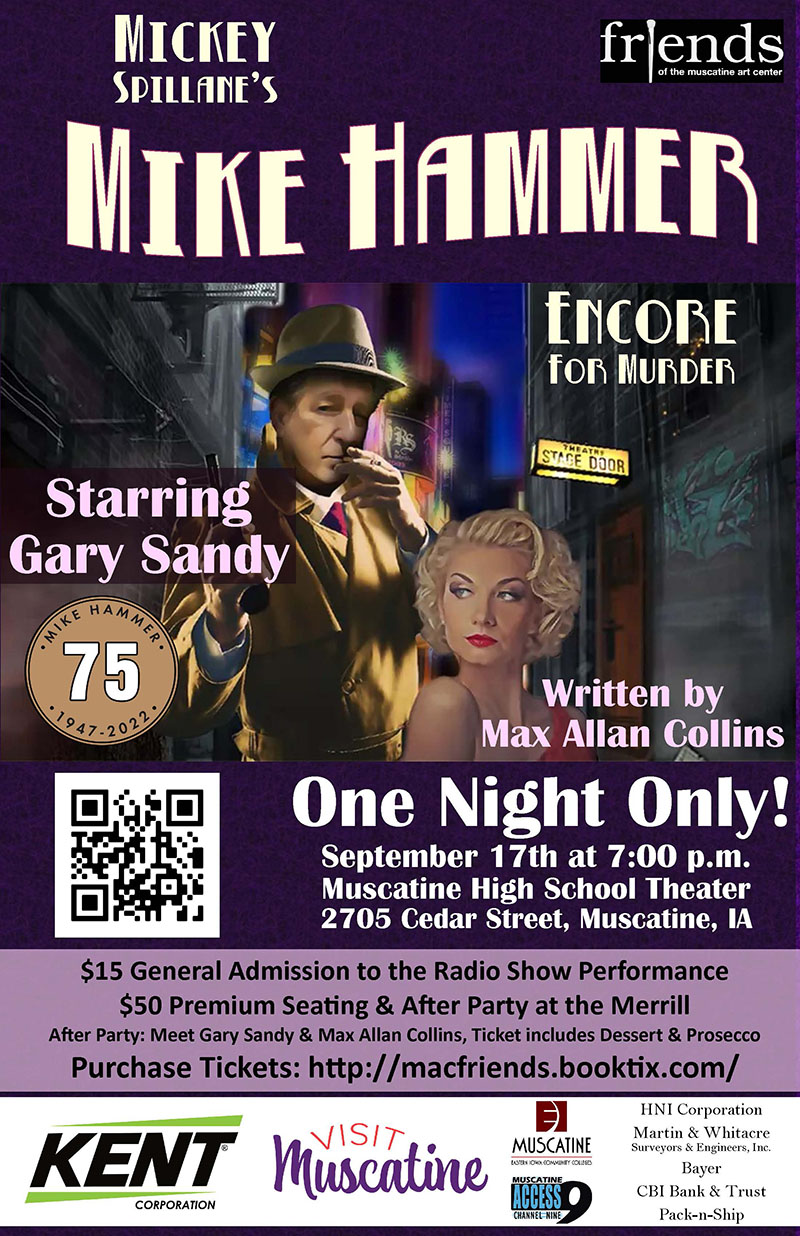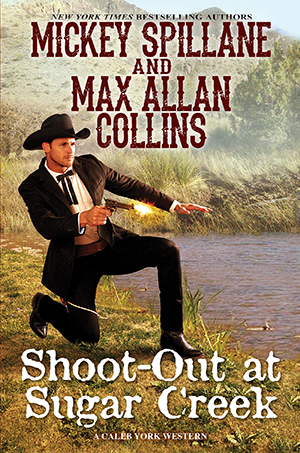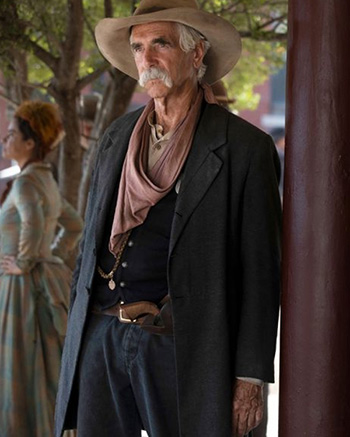
Paperback:





Hardcover:




E-Book:





Digital Audiobook:



Audio MP3 CD:




Audio CD:




Audio Sample:
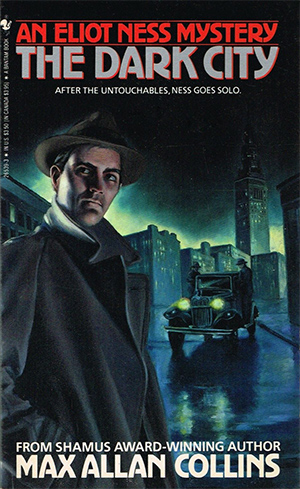
The Dark City, 1987 Bantam Paperback
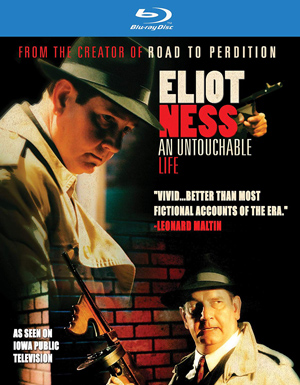
Eliot Ness: An Untouchable Life
2007 Blu-Ray, VCI
A new book is out about Eliot Ness and the Mad Butcher. I’m not going to share the name or much information about that book with you, because the book you should be buying and reading is the 600-page Eliot Ness and the Mad Butcher by A. Brad Schwartz and me, available now in a handsome and inexpensive ($15.49) trade paperback.
This other Ness/Butcher book (350 pages) is about as redundant and unnecessary a volume as I can imagine. But history is fair game, true crime included, and it’s not like this hasn’t happened to me before.
My theories developed about various unsolved or controversially solved crimes in my Nathan Heller novels have paved the way for non-fiction writers who didn’t have to (and didn’t) credit me, since I had merely written a novel. That those novels are crammed with research, often aided by George Hagenauer and done on site and in libraries and raiding old bookstores at much time and expense, didn’t matter a whit.
My novel Butcher’s Dozen, published in 1988, was the first book-length look at Ness and the Mad Butcher case, and George and I did much on site research about the case, and at Case Western Reserve Library found the massive Ness scrapbooks that hadn’t been seen since 1961 when Oscar Fraley wrote Four Against the Mob about Ness in Cleveland, the only book about Ness in Cleveland prior to my The Dark City in 1987. Since then have come any number of books about the case, including a graphic novel by a guy who used to write fannishly to the letter column of Ms. Tree (where Butcher’s Dozen was announced, advertised and discussed); there have also been scads of movies announced but never made.
Fair game, all of it. Dirty pool, at times, but within the rules.
And I am not here to cry plagiarism against the author of this new Ness/Butcher book. Maybe to cry “foul” a little. Here’s why. As part of the promotion of the book, the Smithsonian announced the author’s appearance for an event called “Eliot Ness: An Untouchable Life,” featuring an actor playing Ness (as well as the author).
Some of you may know that I wrote a play that I adapted into a 2005 film for Iowa PBS of that very name – a one-man show with the late Michael Cornelison as Ness. I wrote the Smithsonian and complained. The author wrote me an e-mail saying the title hadn’t been his idea, and that he really admired my work very much. But he assured me that his September 2022 book had not been influenced by the Collins/Schwartz August 2020 book because, after all, he had concluded his research in 2019.
Uh, right.
The author claimed to have great respect for me, but the only book about Ness of mine that is (minorly) referenced in his new book is the Collins/Schwartz Scarface and the Untouchable (2018). There is a vague reference by this self-professed longtime Ness buff in the new book’s prologue (without mention of my name) to my Ness/Batman graphic novel, Scar of the Bat. No mention of Ness being a character in True Detective and subsequent Nate Heller novels. No mention of the four Eliot Ness in Cleveland novels, which have often been prominently mentioned in lectures and in print by Cleveland’s predominant Ness expert, Rebecca McFarland. And of course no mention of either An Untouchable Life or Eliot Ness and the Mad Butcher.
It’s a tad hard to imagine that an Eliot Ness buff would never have heard of me or my pioneering research efforts (initially with George Hagenauer and later with Brad Schwartz, the latter the major Ness expert on the planet).
And it’s been frustrating to see friends and friendly acquaintances of mine extolling the virtues of this competitive book with no mention (or possibly awareness) of our book. The MWA Edgar committees did not acknowledge either of our massive, and frankly ground-breaking books, but the author of this new Ness/Butcher book seems a shoo-in, as he’s won before. That howl of anguish you will hear, should this author be nominated or win, will (I assure) you have emanated from Iowa (and Princeton).
When we queried the publisher (also the publisher of four Nate Heller novels, the most recent, Do No Harm, featuring Ness prominently…in Cleveland!) with questions about research material from our book that seemed to have made its way into this new one, we were assured that the author simply used the same sources we had. We were unable to confirm that, but we have been assured that future editions of this rival book will have some mention of ours, perhaps in a “recommended further reading” manner.
We appreciate that.
We don’t intend to take this any further. But if you are thinking about reading – or recommending – a book on this subject, please consider doing what the author of this new Ness/Butcher book doesn’t do: mention Eliot Ness and the Mad Butcher by Max Allan Collins and A. Brad Schwartz.
[UPDATE to this week’s UPDATE written 9/25/’22:] In the Smithsonian event last night (9/26/’22), the author of the Ness/Butcher book did, if belatedly, acknowledge the two Collins/Shwartz Ness non-fiction books, giving them a full screen to themselves. He also listed me as one of “many” who have written Ness novels. That I was the first was not mentioned, nor was my role in rediscovering the Ness scrapbooks. Nor was the one-man show/feature presentation, Eliot Ness: An Untouchable Life. But it’s a start.
On a happier note, I’d like to share a wonderful (starred!) review from Publisher’s Weekly of the forthcoming new Nate Heller novel, The Big Bundle due out Dec. 6.
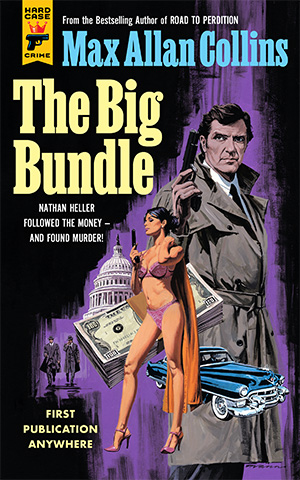
Max Allan Collins. Hard Case Crime, $22.99 (304p) ISBN 978-1-78909-852-5
In MWA Grand Master Collins’s superb 18th Nathan Heller novel, (after 2020’s Do No Harm), the PI crosses paths with Robert Kennedy and Jimmy Hoffa. It’s 1953 in Kansas City, Mo., when millionaire Robert Greenlease retains Heller’s services after his six-year-old son, Bobby, is kidnapped and ransomed for $600,000. Greenlease makes the payment, but the kidnappers delay returning the child. Heller uses his underworld contacts to try to get a lead on Bobby’s whereabouts by attempting to trace the marked bills used for the payoff, though he fears that the boy is already dead. Flash forward to 1958. Heller is working both for Hoffa, the corrupt Teamsters leader, and Kennedy, then chief counsel for the Senate Rackets Committee, who’s looking to nail Hoffa. With half of the ransom never accounted for, Kennedy hopes Heller can help him prove it ended up in the Teamsters Pension Fund. Heller’s search for the money and the truth behind Bobby’s abduction proves perilous. Collins again artfully uses a real-life crime, one now obscure but headline-making in the 1950s, as the springboard for a crackerjack plot. This is another standout in a consistently good series.
And I have to share this nifty Big Bundle review from the great Ron Fortier, whose “Pulp Fiction Reviews” column is always a fun, informative read.
by Max Allan Collins
Hard Case Crimes
Arriving Dec 6th 2022
295 pgs
This is the 20th in the Nate Heller historical crime series by Collins. If you are unfamiliar with them, the conceit is simple enough. Collins, either working alone, or with other collaborators, researches an actual American crime and then drops his fictional private eye into the tale as either an investigator or actual participant in the events. In this case, he becomes both. The story revolves around the 1953 kidnapping of young Bobby Greenlease of Kansas City. The six year old was the son of Robert Cosgrove Greenlease Sr, a multi-millionaire auto dealer. His kidnappers were paid a ransom of $60,000, the largest ever paid out in American history at that time.
Collins splits the book in two parts. The first has Heller hired by Greenlease Sr. to help find the kidnappers and rescue his son. We’ve always admired Collin’s ability to empathize with his characters and that is never more evidenced than here. Believing the boy is already dead, after finding Hall, Heller’s emotional restraint is nothing short of painful as his desire to blow away the scumbag killer is kept in check with having to learn the truth. His portrayal of Carl Hall is both deft and creepy at the same time.
At the time of the couples’ eventual arrest, only half the money was recovered. Five years later the mystery remains as to where it went and who ended up with it. Reporters and police investigators suggested the funds had been laundered through organized crime and ended up in Jimmy Hoffa’s Teamsters Union Fund. Thus Greenlease Sr. once again hires Heller; this time to find out where it went. Not because he needs the money, but is sickened by the thought that unknown lowlifes profited from his son’s abduction. Like his previous Heller books, Collins skillfully weaves his protagonist through the documented historical facts having him cross paths with such players Hoffa and Bobby Kennedy.
“The Big Bundle” is classic Max Collins, that alone should have you pre-ordering it. Of all his Heller novels to date, this one will leave you feeling as if you’d been sucker punched. Since the Garden of Eden, evil has existed in our world. In 1953, it reared its head tragically.
A final note. We rarely mention of the covers of books we review. Hard Case Crime is one of the few publishers out there that always delivers stunning paintings reminiscent of the early 50s paperbacks. Paul Mann does the honors on this title offering up a Nate Heller who looks a whole lot like the late actor Robert Lansing. What we’d call brilliant casting, Mr. Mann.
And the love fest continues with this great Library Journal review of the about-to-be-published (Oct. 4) new Barbara Allan novel, Antiques Liquidation.
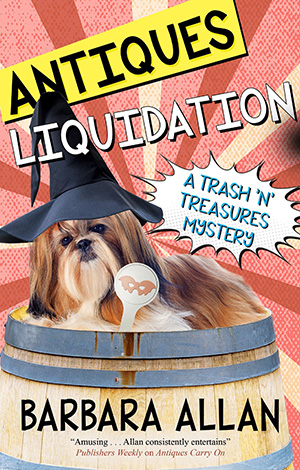
by Barbara Allan
Severn House.
(A Trash ’n’ Treasures Mystery, Bk. 16).
Oct. 2022. 208p. ISBN 9780727850911. $29.99.
Brandy once again finds herself an unwilling partner to her septuagenarian mother’s antiques subterfuge in Allan’s 16th “Trash ’N’ Treasures” mystery (following Antiques Carry On). Awoken early in the morning by Vivian for a shady antiques shopping trip, Brandy is prepared for something to go wrong. With a little blackmail, Vivian has secured access to the auction goods before the auction happens. She has her choice of deadstock, and after an encounter with the police, is able to take it safely home. However, murder is never far behind where Brandy and Vivian are involved, and the auctioneer soon turns up dead. Vivian adds her own interpretation of events throughout the book, often to humorous effect. Readers will also find several recipes and Vivian’s tips for buying and selling antiques. Brandy’s asides about events in the previous novels will help new readers to enjoy this installment without having read the rest of the series. Fans who are returning to the series will continue to find humor in Brandy and Vivian’s relationship and will enjoy seeing favorite characters return.
VERDICT: Best for readers of cozy mysteries who enjoy small-town living, humor with a side of murder, and cute canine companions.
Reviewed by Tristan Draper, Aug 26, 2022
Our old pard Caleb York is getting a boost from Kensington, who will run price discount promotions on the York novels during October at major eBook retailers. For example, Shoot-out at Sugar Creek will be promoted with a BookBub blast on 10/8/2022 – a rootin’ tootin’ 99-cents!
The aftermath of the presentation here in Muscatine, Iowa, on September 17 of Gary Sandy in my play, Encore for Murder (developed from a Mickey Spillane synopsis), has been gratifying. The people who saw it have approached me with praise, and others with regret that they didn’t see it.
We have just started to scratch the surface of the voluminous footage we gathered on HD of the performance. Excerpts (and interview footage of Gary Sandy and the Velda and Pat Chambers actors) will be included in the new version of my 1999 Spillane documentary, in progress. And I am hopeful we will have a complete feature version of the recorded play as well. I haven’t spent much time in editing suites in recent years and can’t wait to get back in there with Phil Dingeldein and our new buddy Chad Bishop.
Finally, Craig Zablo gives The Big Bundle a big boost here!
M.A.C.
